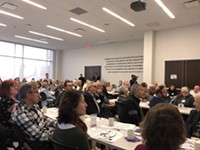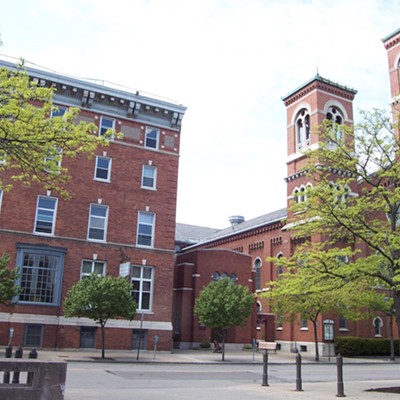[
{
"name": "500x250 Ad",
"insertPoint": "5",
"component": "15667920",
"parentWrapperClass": "",
"requiredCountToDisplay": "1"
}
]
Griselda Trejo has built herself a good life, one she wants to keep.
The 24-year-old Sodus resident is married; has two children, one 2 and the other 7; and has a job making things for the Navy, such as headsets. But she fears that she won't have this life much longer.
Trejo's parents brought her to the US from Mexico when she was 5, and they were all undocumented immigrants. She hasn't been back to Mexico since. She loves the United States, considers it her home, and has been able to live here openly and without fear of deportation since 2012, when she applied for and received Deferred Action for Childhood Arrivals (DACA) authorization from the federal government.
Former President Barack Obama started DACA that year through an executive order. But President Donald Trump and members of his cabinet have announced that they're stopping the program. The Trump administration promises an orderly end and says it will honor current authorizations, which last two years. But it won't grant new ones, and it won't renew existing authorizations once they expire, with one very limited exception.
Trejo expects that she'll have to stop working. And she won't be able to drive her 7-year-old son to school anymore, a routine she cherishes because he's had several surgeries
"It's just taking a part of our life away, that's what they're doing," Trejo said during an interview last week.
Trejo is one of an estimated 800,000 people who are currently living in the US and working or studying under DACA. There's no precise estimate for the number living in the Rochester region, but there are around 42,000 living in New York. New York City Mayor Bill DeBlasio says there are 30,000 in New York City alone, which leaves roughly 12,000 across the rest of New York State.
Leaders across New York vowed to resist the Trump administration's decision. New York Attorney General Eric Schneiderman has filed a lawsuit against it. The New York Catholic Conference, which represents the state's bishops, is vocally encouraging Congress members to reinstate DACA. And University of Rochester President Joel Seligman vowed that it would do everything within its legal powers to support its undocumented students and employees who work or study under DACA.
"Our University is immeasurably better and stronger because of its diverse student body," Seligman said in a published statement. "We are both a global university and the Rochester family where we value and support one another, even under challenging circumstances and uncertainties."
DACA is not an amnesty program, says Wedade Abdallah, immigration program director at the Legal Aid Society of Rochester. It allowed people who came to the US before they were 16, and who have lived in the country continuously since 2007, to work or go to school and to live their lives in the open, Abdallah says.
"They've been able to live normally – as normally as possible – in the United States without fear of the government deporting them," Abdallah says.
Looking for
legal help?
Area residents who have a DACA authorization and need legal help can call the Legal Aid Society of Rochester's intake line at (585) 232-4090.
John Ghertner, who works with migrant workers in Wayne County, says that if Trump and Congressional Republicans think rescinding DACA will make its recipients return to their countries of birth, they're mistaken.
"They're not going to go home, I can promise you that, until they're forced to by law enforcement," Ghertner says. "I think the underground economy in this population is gonna grow again."
And like Trejo, many of the DACA recipients have children who, since they were born in the US, are citizens. Those children have a legal right to live here.
Ghertner worries about the stress that Trump's DACA decision will place on families as parents lose their jobs and they're pushed into poverty. And he worries about the well-being of the children. He expects that children of parents with DACA authorizations will experience dramatic psychological effects, including an increase in depression. In the past when immigration issues have flared up and families have been thrust into uncertainty, he's seen youth become suicidal.
"The rules are changed," Ghertner says. "But in defense of the system, we knew from Day 1 that this day was possible. Nobody wanted to believe it, but we knew that this was possible, that the next president or Congress could do something to abort this. That doesn't lessen the blow, obviously, but it is a fact."
Speaking of...
-

Two quintessentially American stories on film open virtually on Friday
Feb 12, 2021 -

Immigration finds some common ground in local survey
Nov 25, 2019 -

WALL\THERAPY 2018 recap
Jul 31, 2018 - More »
Latest in News
More by Jeremy Moule
-

ROCHESTER TEN
ANNETTE RAMOSAug 1, 2023 - More »






